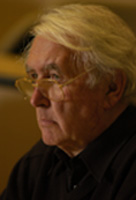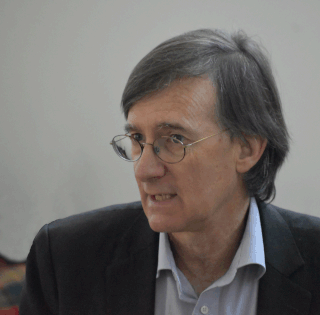Related Research Articles

Hans-Georg Gadamer was a German philosopher of the continental tradition, best known for his 1960 magnum opus, Truth and Method, on hermeneutics.

Metaphilosophy, sometimes called the philosophy of philosophy, is "the investigation of the nature of philosophy". Its subject matter includes the aims of philosophy, the boundaries of philosophy, and its methods. Thus, while philosophy characteristically inquires into the nature of being, the reality of objects, the possibility of knowledge, the nature of truth, and so on, metaphilosophy is the self-reflective inquiry into the nature, aims, and methods of the activity that makes these kinds of inquiries, by asking what is philosophy itself, what sorts of questions it should ask, how it might pose and answer them, and what it can achieve in doing so. It is considered by some to be a subject prior and preparatory to philosophy, while others see it as inherently a part of philosophy, or automatically a part of philosophy while others adopt some combination of these views.

Hermeneutics is the theory and methodology of interpretation, especially the interpretation of biblical texts, wisdom literature, as well as philosophical texts. As necessary, hermeneutics may include the art of understanding and communication.

Analytic philosophy is a branch and tradition of philosophy using analysis, popular in the Western world and particularly the Anglosphere, which began around the turn of the 20th century in the contemporary era in the United Kingdom, United States, Canada, Australia, New Zealand, and Scandinavia, and continues today. Analytic philosophy is often contrasted with continental philosophy, coined as a catch-all term for other methods, prominent in Europe.

John Henry McDowell, FBA is a South African philosopher, formerly a fellow of University College, Oxford, and now university professor at the University of Pittsburgh. Although he has written on metaphysics, epistemology, ancient philosophy, nature, and meta-ethics, McDowell's most influential work has been in the philosophy of mind and philosophy of language. McDowell was one of three recipients of the 2010 Andrew W. Mellon Foundation's Distinguished Achievement Award, and is a Fellow of both the American Academy of Arts & Sciences and the British Academy.

Continental philosophy is a term used to describe some philosophers and philosophical traditions that do not fall under the umbrella of analytic philosophy. However, there is no academic consensus on the definition of continental philosophy. Prior to the twentieth century, the term "continental" was used broadly to refer to philosophy from continental Europe. A different use of the term originated among English-speaking philosophers in the second half of the 20th century, who used it to refer to a range of thinkers and traditions outside the analytic movement. Continental philosophy includes German idealism, phenomenology, existentialism, hermeneutics, structuralism, post-structuralism, deconstruction, French feminism, psychoanalytic theory, and the critical theory of the Frankfurt School as well as branches of Freudian, Hegelian and Western Marxist views. There is widespread influence and debate between the analytic and continental traditions; some philosophers see the differences between the two traditions as being based on institutions, relationships, and ideology rather than anything of significant philosophical substance.

Contemporary philosophy is the present period in the history of Western philosophy beginning at the early 20th century with the increasing professionalization of the discipline and the rise of analytic and continental philosophy.

Dewi Zephaniah Phillips, known as D. Z. Phillips or simply DZ, was a Welsh philosopher. He was a leading proponent of the Wittgensteinian philosophy of religion. He had an academic career spanning five decades, and at the time of his death he held the Danforth Chair in Philosophy of Religion at Claremont Graduate University, California, and was Professor Emeritus of Philosophy at Swansea University.
Arthur John Terence Dibben Wisdom, usually cited as John Wisdom, was a leading British philosopher considered to be an ordinary language philosopher, a philosopher of mind and a metaphysician. He was influenced by G.E. Moore, Ludwig Wittgenstein and Sigmund Freud, and in turn explained and extended their work.

Peter Michael Stephan Hacker is a British philosopher. His principal expertise is in the philosophy of mind, philosophy of language, and philosophical anthropology. He is known for his detailed exegesis and interpretation of the philosophy of Ludwig Wittgenstein, his critique of cognitive neuroscience, and for his comprehensive studies of human nature.
Martin Kusch is Professor of philosophy at the University of Vienna. Until 2009, Kusch was Professor of Philosophy and Sociology of science at the Department of History and Philosophy of Science at Cambridge University. Prior to Cambridge, Kusch was lecturer in the Science Studies Unit of the University of Edinburgh.

Jeff Malpas is an Australian philosopher and emeritus distinguished professor at the University of Tasmania in Hobart. Known internationally for his work across the analytic and continental traditions, Malpas is also at the forefront of contemporary philosophical research on the concept of "place", as first and most comprehensively presented in his Place and Experience: A Philosophical Topography—now in its second edition—and further developed in numerous subsequent works.
David Edward Cooper is Emeritus Professor of Philosophy at Durham University.

Richard Jacob Bernstein was an American philosopher who taught for many years at Haverford College and then at The New School for Social Research, where he was Vera List Professor of Philosophy. Bernstein wrote extensively about a broad array of issues and philosophical traditions including American pragmatism, neopragmatism, critical theory, deconstruction, social philosophy, political philosophy, and hermeneutics.
Mark Addis FRSA is a British philosopher who is known for his work on Ludwig Wittgenstein
Hans-Johann Glock is a German philosopher and professor of philosophy at the University of Zurich.

Margaret MacDonald was a British analytic philosopher. She worked in the areas of philosophy of language, political philosophy and aesthetics.
Nicholas Davey is a British philosopher and professor of philosophy at the University of Dundee. He is known for his expertise in aesthetics, hermeneutics, and his work on Hans-Georg Gadamer. Davey has also played a leading role in founding several research groups and institutes at the University of Dundee, which include Theoros, Hermeneutica Scotia, and the university's Arts and Humanities Research Institute.
David Ewart George Boucher FRHISTS FACSS FLSW is a Welsh political theorist and philosopher of international relations.
Niall Keane is an Irish philosopher and senior lecturer in philosophy at the University of the West of England. Previously he taught at the University of Limerick, Ireland. Keane is known for his works on Gadamer's thought and hermeneutics.
References
- ↑ "Annual Guide". Mary Immaculate College. 2011–2012. p. 129 – via Yumpu.
- ↑ Reviews of Wittgenstein and Gadamer:
- Tanesini, Alessandra (2006). "Wittgenstein and Gadamer: Towards a Post-Analytic Philosophy of Language". Radical Philosophy. 135.
- Briggs, Richard S. (May 2009). "Wittgenstein and Gadamer: towards a Post-Analytic Philosophy of Language. By Chris Lawn". The Heythrop Journal. 50 (3): 550–551. doi: 10.1111/j.1468-2265.2009.00484_36.x .
- Dostal, Robert (18 June 2005). "Review of Wittgenstein and Gadamer: Towards a Post-Analytic Philosophy of Language". Notre Dame Philosophical Review. ISSN 1538-1617.
- Barthold, L. S (August 2005). "Chris Lawn, Wittgenstein and Gadamer: Towards a Post-Analytic Philosophy of Language". Philosophy in Review. 25 (4): 271–273.
- Aho, Kevin (June 2006). "Book Reviews". The European Legacy. 11 (3): 333–334. doi:10.1080/10848770600668431.
- ↑ Review of Gadamer: a Guide for the Perplexed:
- Drechsler, Wolfgang (April 2007). "Chris Lawn, "Gadamer: A Guide for the Perplexed."". Philosophy in Review . 27 (2): 124–6.
- ↑ Review of The Gadamer Dictionary:
- Moore, Michael Edward (July 2013). "The Gadamer Dictionary". The European Legacy. 18 (4): 520–521. doi:10.1080/10848770.2013.791451.